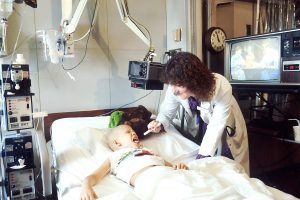
Do you enjoy helping people? Why not consider a career in nursing? Public health nurse protects community health, playing a key role in society.
These specialized nurses are providers, advocates, and educators of public health services and are indispensable for Canadian communities across the country.
As a public health nurse, you have plenty of job opportunities in all provinces. Ontario is the country’s largest province and home to nearly 40% of Canada’s population.
Public health nurses are highly sought after by the medical community in cities and towns across the region.
This post looks at how to become a public health nurse in Ontario. We’ll give you everything you need to know about qualifying for the job, your duties, and responsibilities, and what you can expect to earn in your position.
What Do Public Health Nurses Do?
A public health nurse plays a key role in safeguarding and educating the community about disease prevention and best practices for attaining optimal health.
They promote health and safety standards, helping people back to health after experiencing health incidents from incidents such as accidents, disasters, and outbreaks of disease.
Public health nurses serve the following roles in the community.
- Assessment – Public health nurses collect and analyze data in disease outbreaks, such as COVID, looking for patterns to plan, execute, and monitor response community health campaigns.
- Advocacy – Public health nurses work with state and local health authorities to champion the improvement of health service access to people in underserved Canadian communities.
- Collaboration – Public health nurses network and collaborate with local healthcare professionals, public officials, patients, and the community to better serve the macro and individual needs of the people.
- Education – Public health nurses teach the community about disease prevention, empowering people with the knowledge they need to live healthy lifestyles.
- Communication – Public health nurses stay in close contact with individuals, families, and community stakeholders to determine the communities healthcare requirements.
- Intervention – Public health nurses will intervene in challenging scenarios involving suspected psychological, physical, or sexual abuse or violence.
- Management – Public health nurses provide community support with careful resource and budget management.
- Leadership – Public health nurses provide community leadership during public health emergencies.
- Treatment – Public health nurses administer immunizations, medications, and advice. They also perform health screenings for public benefit.
6 Steps to Becoming a Public Health Nurse

So, how do you land a career as a public health nurse? Let’s look at the steps to qualifying for the position and how to find a job.
Step 1 – Complete Your Formal Education
The qualification requirements for public nurses differ, depending on your location in Canada. However, in Ontario, nursing candidates must enter post-secondary studies. The program you choose depends on the specialization you wish to follow.
The minimum qualification for a public health nurse is a course qualifying you as a Registered Nurse (RN). You’ll need to complete a four-year degree with a university program accredited by the Canadian Association of Schools of Nursing.
Step 2 – Pass Your National Council Licensure Exam
The next step is undertaking The National Council Licensure Exam (NCLEX) to start practicing as an RN and enter community health services. The National Council of State Boards of Nursing (NCSBN), the global nonprofit, administers this national licensing examination in Canada.
You’ll need to pass the licensing exam to gain registration as an RN in all Canadian provinces and territories. It’s a good idea to examine the regulatory body’s eligibility requirements in your region as they differ across the country.
The NCLEX exam doesn’t test candidates on their knowledge of the health care system. It tests your skills, knowledge, and judgment, enabling you to provide safe and proper healthcare at a beginner nurse level.
Step 3 – Obtain Your Nursing License
Candidates require a practicing registration and RN qualification with their local regulatory body. To obtain a license allowing you to work as an RN, you’ll need to meet the mandatory requirements of the nursing regulatory body in Ontario.
Generally, you’ll need the following.
- The completion of your diploma or degree.
- The completion of your nursing program from an accredited college or university.
Pass the NCLEX exam – You’ll undertake the jurisprudence examination, testing your knowledge of relevant regulations and laws and the standards and guidelines of nursing professions in Ontario.
Demonstrate language skills – You must be proficient in English to work as a nurse in Ontario.
Show residency status or proof of citizenship – The regulatory body asks you to provide a work permit or authorization if you’re not a permanent resident or citizen of Canada.
Disclose your current health status – Declare physical or mental conditions affecting your work.
Step 4 – Gain Work Experience
A public health nurse isn’t an entry-level role in the nursing profession. It requires you to spend many years in other nursing roles before you gain the experience and accreditations to move into public health nursing.
Many employers prefer candidates with a minimum of two years of work experience in the healthcare industry. They’ll consider candidates with a combination of professional experience and training.
After passing the NCLEX exam and receiving RN registration, you’ll first work in a health facility to gain skills and experience.
To improve your chances of finding a job as a public health nurse, you’ll need to look for employment opportunities in a primary healthcare setting, an Emergency Room (ER), or in public health units and community health centers.
Step 5 – Apply for a Position as a Community Health Nurse
Private companies and government organizations employ public health nurses. These professionals work in nonprofit organizations, schools, correctional facilities, community health centers, and government agencies.
Nursing is a high-demand profession, and you’ll find it easy to secure a job. Before submitting your application to potential employers, review your job description to determine your suitability for your role.
Step 6 – Earn Certifications for Career Advancement
Earning the Community Health Nursing Certification improves your nursing credentials, boosts your chances of finding a higher-paying job, and your chances of getting a salary increase from your present employer.
The Canadian Nurses Association’s Certification Program offers certification exams in various nursing specialties. While they aren’t a requirement, they’re useful for advancing your career.
Nursing practitioners and RNs in the community health sector who obtain certification earn the designation of “Certified in Community Health Nursing Canada.” You can use your CCHN(C) credentials to demonstrate competency and expertise in your field.
Where Does a Public Health Nurse Work?

Public health nurses have plenty of job opportunities in communities across Ontario. Here are five public health settings employing public health nurses.
Outpatient Clinics – Public health nurses address immediate concerns, request tests, and prescribe medications; they can also take leadership roles in public health education.
Government Organizations – National, state, or county health departments hire public health nurses. They assist with policy development and improving the overall health of the population in Ontario. These positions focus on paperwork and administration procedures rather than dealing with patients.
Community Clinics – Public health nurses work with the community in clinical settings, dealing with various public health concerns.
As a result of their work, public health nurses operating in these environments form the front line of educational program development, teaching the community about health and how to improve it. They offer public community-based or individual-based advice.
Schools – Public health nurses assist children and parents in addressing health issues in schools. They educate children on strategies to maintain optimal health, personal hygiene strategies, and issues involving sexual health and disease prevention.
These nurses also monitor at-risk children, looking for signs of neglect or abuse.
Voluntary Organizations – Several organizations assist with delivering healthcare solutions in public settings. These groups include The Peace Corps, Doctors Without Borders, and the Red Cross.
The duties of public health nurses working in these institutions include education, disaster relief, family planning, drinking water safety, sexual health, hygiene, and others.
The 8 Tenets Of Public Health Nursing
According to The Quad Council of Public Health Nursing Organizations, all public health nurses must comply with “The 8 Tenets of Public Health Nursing.” They follow this code to improve and protect the general population’s health.
- Policy development, population-based assessments, and health assurance processes are comprehensive and systematic.
- All processes involve partnering with public representatives.
- Priority lands with primary prevention.
- Selection of intervention strategies to create healthy economic, social, and environmental conditions allowing people and communities to thrive.
- An obligation to reach out to individuals who can benefit from services or interventions.
- The dominant obligation or concern is for the greater good of the population, communities, and individuals.
- Allocation and stewardship of available resources to provide maximum population health benefits.
- Collaboration with professionals and organizations to promote and steer public health initiatives and policies.
Public Health Nurse Vs. Public Health Specialist – What’s The Difference?
There’s a difference between a public health nurse and a public health specialist. Public health nurses perform many job functions provided by a public health specialist.
The most significant difference between a public health nurse and a public health specialist is perhaps that nurses have clinical experience alongside their educational background to provide healthcare services to patients.
Public health nurses focus on treating groups of people, while public health specialists treat individuals. Entry-level public health nursing jobs may only require candidates to hold a BSN; however, those candidates looking to become public health nurses must be RNs.
Considering the leadership skills required by the position, it’s recommended that candidates hold an MSN. Public health specialists focus on improving individual health outcomes through education, research, and prevention.
These areas include disease etiology, environmental health, nutrition, and occupational health.
The public health specialist has the following job responsibilities.
- Organizing and implementing research and studies to improve outcomes in public health.
- Analysis, research, and report on disease patterns and data surrounding infection rates.
- Analyze data using applied qualitative and statistical models and methods.
- Provide feedback to companies and organizations seeking to improve and enhance employee health and safety.
- Communicate their research findings to stakeholders and clinicians.
- Implements, design, and manage public health outcomes and programs.
While the public health specialist designs and develops health interventions, the public health nurse assists with carrying out health interventions, especially when administering care to the public.
What Are The Average Salaries For Public Health Nurses In Ontario?

Public health nurses receive a salary based on their experience, qualifications, and certifications. You could earn more or less depending on where you work in Ontario and your workplace setting.
For instance, a public health nurse working at a private school will likely receive a higher salary than someone working in a government institution.
According to information on average salaries for public nurses in Ontario, the annual salary is $99.009 per annum or $42.86 per hour.
How To Make More Money As a Public Health Nurse
If you want to increase your salary as a public health nurse, you’ll need to work in private medical offices, private schools, and other exclusive settings.
As with all nursing jobs, your potential earnings increase as you gain experience and certification. Public health nurses usually receive an increase each year in line with the annual inflation rate, and they will receive a bonus during Christmas.
How To Become a Public Health Nurse In Ontario – FAQs
Q: Is a Career As a Public Health Nurse a Good Choice In The Medical Sector?
A: According to information from Canada, the United States, and the UK, nursing is a growth sector, requiring more applicants each year.
The number of job opportunities for public health nurses in Canada will grow by 7% from 2019 to 2029. That’s a significant increase compared to other professions, presenting candidates with plenty of opportunities.
Q: What Are The Key Differences Between Public Health Specialists And Public Health Nurses?
A: Both the public health specialist and public health nurse have the best interests of public health in mind with their job. However, the qualifications required for the position are different. Nurses receive certification by presenting competence in clinical experience and medical knowledge.
However, health specialists don’t need this requirement to have a successful career. Public health nurses and other public health professionals focus on enhancing community health. However, public health nurses work with physicians, care for patients, and administer medicine.










